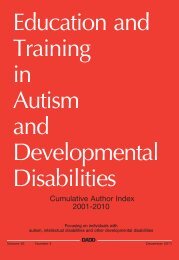Download the Journal (PDF) - Division on Autism and ...
Download the Journal (PDF) - Division on Autism and ...
Download the Journal (PDF) - Division on Autism and ...
You also want an ePaper? Increase the reach of your titles
YUMPU automatically turns print PDFs into web optimized ePapers that Google loves.
Despite Paula’s descripti<strong>on</strong> of an ideal curriculum,<br />
her students received little-to-no activities<br />
in daily living at school. Her life management<br />
class involved students reading a<br />
textbook, answering questi<strong>on</strong>s, <strong>and</strong> discussing<br />
topics, ra<str<strong>on</strong>g>the</str<strong>on</strong>g>r than <str<strong>on</strong>g>the</str<strong>on</strong>g> h<strong>and</strong>s-<strong>on</strong> activities she<br />
talked about in interviews.<br />
Data also revealed an associati<strong>on</strong> between<br />
each school’s philosophy <strong>and</strong> <str<strong>on</strong>g>the</str<strong>on</strong>g> enactment<br />
of a functi<strong>on</strong>al curriculum. Yet, it was not <str<strong>on</strong>g>the</str<strong>on</strong>g><br />
schools’ explicit philosophies “to make lifel<strong>on</strong>g<br />
learners out of <str<strong>on</strong>g>the</str<strong>on</strong>g>se kids <strong>and</strong> have <str<strong>on</strong>g>the</str<strong>on</strong>g>m<br />
participating in <str<strong>on</strong>g>the</str<strong>on</strong>g> community” (Interview,<br />
March 15, 2005) <strong>and</strong> “safety <strong>and</strong> <str<strong>on</strong>g>the</str<strong>on</strong>g> importance<br />
to learn something new each day <strong>and</strong> to<br />
strive to better yourself everyday” (Interview,<br />
June 14, 2005) that were as relevant as <str<strong>on</strong>g>the</str<strong>on</strong>g><br />
schools’ implicit philosophies.<br />
At Paula’s school, <str<strong>on</strong>g>the</str<strong>on</strong>g> office often asked her<br />
students to do things that were not asked of<br />
o<str<strong>on</strong>g>the</str<strong>on</strong>g>r students. One day <str<strong>on</strong>g>the</str<strong>on</strong>g> office called <strong>and</strong><br />
asked Paula if her students could stuff <strong>and</strong><br />
address envelopes <str<strong>on</strong>g>the</str<strong>on</strong>g> next day. Paula agreed<br />
to <str<strong>on</strong>g>the</str<strong>on</strong>g> request, but expressed distress in her<br />
comment, “so much for my less<strong>on</strong> plans tomorrow”<br />
(Fieldnotes, January 28, 2005). In<br />
ano<str<strong>on</strong>g>the</str<strong>on</strong>g>r instance, <str<strong>on</strong>g>the</str<strong>on</strong>g> principal stopped by<br />
Paula’s classroom <strong>and</strong> asked if her students<br />
would clean <str<strong>on</strong>g>the</str<strong>on</strong>g> outside of <str<strong>on</strong>g>the</str<strong>on</strong>g> school that day.<br />
Even though Paula felt that <str<strong>on</strong>g>the</str<strong>on</strong>g>re was some<br />
educati<strong>on</strong>al value to this activity in terms of<br />
work experience, as she designed it so students<br />
had a supervisor <strong>and</strong> were rewarded for<br />
hard work, she still felt trapped into doing this<br />
activity when asked by <str<strong>on</strong>g>the</str<strong>on</strong>g> principal, saying,<br />
“how could I say no to <str<strong>on</strong>g>the</str<strong>on</strong>g> principal, my boss?”<br />
(Fieldnotes, March 28, 2005). Paula’s interpretati<strong>on</strong><br />
of this situati<strong>on</strong> was evident when a<br />
student questi<strong>on</strong>ed <str<strong>on</strong>g>the</str<strong>on</strong>g> request <strong>and</strong> she clarified<br />
why her students take time out of <str<strong>on</strong>g>the</str<strong>on</strong>g>ir<br />
school day to clean <str<strong>on</strong>g>the</str<strong>on</strong>g> school.<br />
Why we do it is that we have pride in our<br />
school. Sec<strong>on</strong>d reas<strong>on</strong> is that it helps our<br />
school look nice <strong>and</strong> helps our custodians.<br />
And in this class, like Mrs. Murphy’s class<br />
[middle school cross-categorical program<br />
teacher] we have more freedom. When <str<strong>on</strong>g>the</str<strong>on</strong>g><br />
principal asks us to do something, he looks<br />
for some<strong>on</strong>e in <str<strong>on</strong>g>the</str<strong>on</strong>g> school who can get <str<strong>on</strong>g>the</str<strong>on</strong>g><br />
job d<strong>on</strong>e (Fieldnotes, March 28, 2005).<br />
Paula c<strong>on</strong>tinued to explain to her students<br />
why <str<strong>on</strong>g>the</str<strong>on</strong>g>y picked up trash outside <str<strong>on</strong>g>the</str<strong>on</strong>g> school.<br />
We stop what we are doing <strong>and</strong> go do that.<br />
You might think golly <str<strong>on</strong>g>the</str<strong>on</strong>g> o<str<strong>on</strong>g>the</str<strong>on</strong>g>r kids d<strong>on</strong>’t<br />
do this. But it gets hot in <str<strong>on</strong>g>the</str<strong>on</strong>g> school <strong>and</strong><br />
<str<strong>on</strong>g>the</str<strong>on</strong>g>y are sitting <str<strong>on</strong>g>the</str<strong>on</strong>g>re doing <str<strong>on</strong>g>the</str<strong>on</strong>g>ir homework.<br />
And if you find m<strong>on</strong>ey, you get to<br />
keep it (Fieldnotes, March 28, 2005).<br />
Although office pers<strong>on</strong>nel did not ask Katie’s<br />
students to engage in work around <str<strong>on</strong>g>the</str<strong>on</strong>g><br />
school, o<str<strong>on</strong>g>the</str<strong>on</strong>g>r school pers<strong>on</strong>nel interrupted<br />
Katie’s program <strong>and</strong> had students participate<br />
in n<strong>on</strong>-classroom work. Marilyn, <str<strong>on</strong>g>the</str<strong>on</strong>g> school<br />
job coach, asked Katie’s students to stuff registrati<strong>on</strong><br />
bags for a community 5K. Marilyn<br />
requested <strong>and</strong> Katie agreed that her students<br />
would take time from classroom activities to<br />
stuff <str<strong>on</strong>g>the</str<strong>on</strong>g> bags with running informati<strong>on</strong> <strong>and</strong><br />
free objects. Katie set aside time in two of her<br />
classes <strong>and</strong> indicated that if <str<strong>on</strong>g>the</str<strong>on</strong>g>re was still a lot<br />
to do her students could start first hour <strong>and</strong><br />
c<strong>on</strong>tinue throughout <str<strong>on</strong>g>the</str<strong>on</strong>g> class periods until<br />
<str<strong>on</strong>g>the</str<strong>on</strong>g>y were completed.<br />
Teacher factor. Although it seems intuitive<br />
that teachers affected <str<strong>on</strong>g>the</str<strong>on</strong>g> enactment of a functi<strong>on</strong>al<br />
curriculum, it is <str<strong>on</strong>g>the</str<strong>on</strong>g> intricacies of <str<strong>on</strong>g>the</str<strong>on</strong>g><br />
teacher factor that are worth discussing.<br />
Teachers were influential in terms of <str<strong>on</strong>g>the</str<strong>on</strong>g>ir<br />
histories, preparati<strong>on</strong>, beliefs <strong>and</strong> philosophies,<br />
<strong>and</strong> expectati<strong>on</strong>s for students. Both<br />
teachers had created <str<strong>on</strong>g>the</str<strong>on</strong>g>ir programs. Paula<br />
started at River Bend five years ago, <str<strong>on</strong>g>the</str<strong>on</strong>g> year<br />
<str<strong>on</strong>g>the</str<strong>on</strong>g> program was started at <str<strong>on</strong>g>the</str<strong>on</strong>g> high school.<br />
She was given relative freedom over <str<strong>on</strong>g>the</str<strong>on</strong>g> curriculum<br />
to choose <str<strong>on</strong>g>the</str<strong>on</strong>g> classes that were included<br />
in her program <strong>and</strong> <str<strong>on</strong>g>the</str<strong>on</strong>g> c<strong>on</strong>tent that<br />
would go into those classes. Katie assumed <str<strong>on</strong>g>the</str<strong>on</strong>g><br />
role of <str<strong>on</strong>g>the</str<strong>on</strong>g> cross-categorical program teacher<br />
at Harborville <str<strong>on</strong>g>the</str<strong>on</strong>g> year after <str<strong>on</strong>g>the</str<strong>on</strong>g> program was<br />
started. However, <str<strong>on</strong>g>the</str<strong>on</strong>g> first teacher had d<strong>on</strong>e<br />
little to establish <str<strong>on</strong>g>the</str<strong>on</strong>g> program <strong>and</strong> Katie was<br />
able to choose <str<strong>on</strong>g>the</str<strong>on</strong>g> curriculum. Yet, she had<br />
restricti<strong>on</strong>s <strong>on</strong> her curriculum in that it was<br />
suppose to align with <str<strong>on</strong>g>the</str<strong>on</strong>g> state’s general educati<strong>on</strong><br />
benchmarks <strong>and</strong> guidelines.<br />
Teachers’ pre-service preparati<strong>on</strong> was influential.<br />
Both teachers attended <str<strong>on</strong>g>the</str<strong>on</strong>g> same midsized<br />
teacher preparati<strong>on</strong> university about<br />
four years apart, yet, <str<strong>on</strong>g>the</str<strong>on</strong>g>y had different<br />
teacher preparati<strong>on</strong> experiences. Katie focused<br />
her preparati<strong>on</strong> <strong>on</strong> sec<strong>on</strong>dary educati<strong>on</strong>,<br />
with a plan to teach at <str<strong>on</strong>g>the</str<strong>on</strong>g> high school<br />
level. Her field experiences occurred in high<br />
school programs, both resource <strong>and</strong> categori-<br />
Factors <strong>and</strong> Functi<strong>on</strong>al Curriculum / 301
















